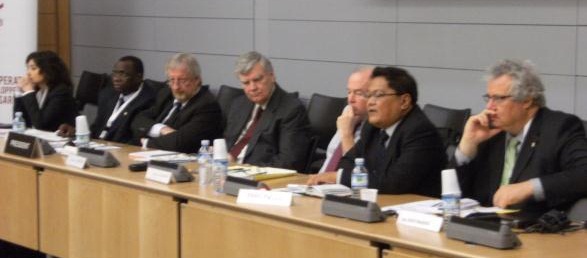The consultation, supported by the BetterAid Civil Society Platform, addressed the promotion of a new development model focusing on the Aid Effectiveness Agenda. In response to comments from John Evans, Secretary General of the Trade Union Advisory Committee to the OECD, Brian Atwood, Chair of the OECD-Development Assistance Committee (DAC) stressed that the Fourth High Level Forum on Development Effectiveness, which will take place in Busan, South Korea in November 2011, will be the final opportunity to fuel more decisive action to achieve the MDGs. He stressed the urgency for action and outlined the ambitions for the Fourth High Level Forum on Development Effectiveness in Busan.
Raymond Torres (International Institute for Labour Studies of ILO), Gemma Adaba (ITUC) and Toni Tujan (BetterAid) identified global challenges for development, including growing inequality as a consequence of unemployment growth and unproductive capital accumulation. Consequently, the need for redistribution policies and for social development strategies to reign over economic strategies was emphasised, in order to foster sustainable growth for development.
Panel discussions on Decent Work and Democratic Ownership introduced the challenges for the specific contributions of the trade union movement to development cooperation policies. Through working groups, priorities and content for the trade union movement were defined regarding issues raised in the preparation for Busan.
Messages from the Democratic Ownership and Accountability Cluster of the Working Party (fostering a shift from voluntary engagement to a standard based system), the International Labour Organisation (highlighting the need for a tripartite engagement inside the ILO) and the European Union (proposing the notion of “country compacts for development”) fuelled the strategy debates that took place on the last day to conclude the consultation’s work.
Bert Koenders, the newly appointed Co-Chair of the Working Party on Aid Effectiveness addressed the closing session. Participants emphasised a need to respond to growing inequality and the enormous problem of youth unemployment or underemployment in the informal sector and its skewed impact on women. They also referred to the recent socially motivated revolutions in the Arab countries, in spite of positive economic reports coming from institutions like the OECD and the IMF. Bert Koenders, in response, welcomed trade unions’ engagement in development cooperation and stressed the importance of Decent Work, including job creation and democratic accountability as cornerstones for sustainable development strategies. He called upon the trade unions and civil society more broadly, to proactively raise concrete proposals for inclusion in the Busan outcomes.
Brian Atwood, DAC Chair and Bert Koenders, Co-Chair of the WP EFF both strongly encouraged trade unions to engage in local development policies and take their place in the international development fora.


